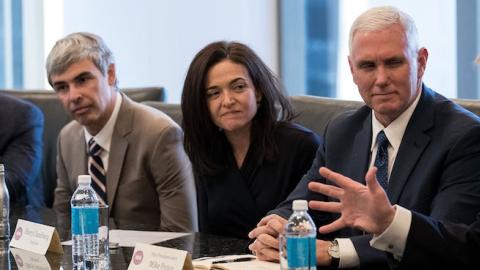On Wednesday President-elect Trump will meet with several high-tech CEOs in New York. Reflecting the political shell-shock of the industry, many firms have not acknowledged receiving an invitation or confirmed whether they will attend.
Had Secretary Clinton won, a post-election meeting with the President-elect would have been a celebratory event in Silicon Valley. Quite likely, the meeting would have been filled with public speeches by day and billionaire-crusted fundraisers by night. Instead, the meeting will be in New York City, with no public speeches and no fundraisers.
Despite employing the intellectual best and brightest and having access to all of the collective information of the world, the high-tech industry misunderstood the presidential election. Few in the high-tech industry thought the election outcome was in doubt: Hillary would win. They donated to Hillary. They publicly praised Hillary. They publicly condemned Trump.
The high-tech industry opposed Trump not because he supported policy positions that would harm the industry; they opposed Trump primarily on social issues unrelated to the fiduciary responsibility to shareholders. A Trump administration would not take positions that would obviously harm the financial health of the tech industry, but a Trump presidency might take positions that would offend the delicate social sensibilities of tech executives. When choosing between social sensibilities and financial fiduciary responsibilities, the former appears to have been given exclusive weight.
When the executives meet President-elect Trump, they could focus on their past differences. Or they could focus on their common goals. The success of the American industry, including high tech, will reinforce the efforts of Trump to allow America to regain economic growth. And the success of the Trump administration in various areas would help the high tech industry. As well as higher economic growth, here are four areas of common interest.
U.S. Deregulation. The unregulated high tech industry increasingly competes in highly-regulated markets such as telecommunications and, under the Obama administration, broadband services. The Senate recently focused on the competition between largely unregulated high tech firms and heavily regulated telecommunications firms. Some high tech companies see asymmetric regulation as beneficial, but those favored by asymmetry in one administration may become the victims in the next. Continuing asymmetric regulation makes no sense. The Trump administration and the high tech industry would both benefit from broader deregulation in these markets to allow the American economy to prosper.
International Deregulation. In many countries including China, governments seek to enlist American high tech companies to assist in governmental wrongdoings such as spying, blocking content, and promoting propaganda. American high tech companies such as Google and Facebook usually resist these efforts, but our government has had little success in protecting American companies from the effects of these abuses. High tech companies and the Trump administration have a common purpose.
In countries such as China, governmental authorities create barriers to limit competition from high tech companies such as Amazon and impose arbitrary conditions to limit the profitability of others such as Qualcomm. Past administrations have failed to protect American companies. The high tech industry and the Trump administration could change that.
In other countries, particularly in the European Union, governments view American tech companies as unwilling instruments to promote various policies. Thus, the EU requires Google and other search engines to monitor individuals so that they may exercise a right to be “forgotten.” The EU views American high tech companies as targets to enhance tax revenues. For example, they just levied a $14 billion fine on Apple. EU antitrust authorities view American high tech companies as convenient targets for governmental intervention in markets where European companies rarely compete. Here again, high tech companies and the Trump administration have a common purpose.
Avoiding Internet Fragmentation. Once seen as a globally interconnected network with the free flow of information to everyone in the world, the Internet is rapidly disintegrating into a series of networks with national boundaries used by national governments as instruments to control their people. The losers include people governed by repressive regimes. But the losers also include American high tech companies that dominate many Internet-related markets. Here again, high tech companies and the Trump administration should have a common purpose.
Defining Internet Property Rights. An expansive Internet is good for people around the world and good for the American economy. Since Adam Smith, economists have recognized that strong and clear property rights are important for the smooth functioning of markets. That simple observation applies equally well to the Internet where property rights for everything from intellectual property to spectrum to Internet access are often under assault. Strengthening property rights on the Internet will benefit the world’s economy and the American economy with much of the world’s high tech companies most of all. Once more, high tech companies and the Trump administration should have a common purpose.
Trump’s election destroyed the myth of omniscience of the high-tech industry. The titans were supposed to be smarter than the rest of us, have better information than the rest, know more about the pulse and predilections of America than anyone else, and be able to predict the future better than the rest of us. It turns out the high tech titans were only human; they proved to be exactly wrong.
When they meet President Trump in New York, the high tech executives should come prepared with a positive view of the future, one in which both the high-tech sector and America are made great again.














